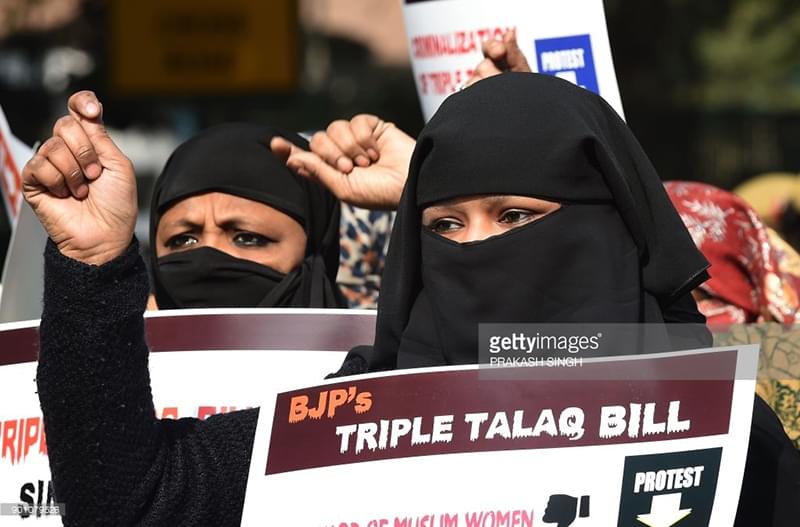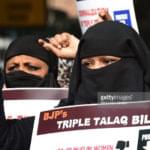Opinions
A Critique of the Talaq Bill

A Critique of the Talaq Bill
By
S.K.T. Nasar
Former Director (Research)
Bidhan Chandra Krishi Viswavidyalaya, Kalyani, West Bengal
(Address: Flat-202, Khaspur Cooperative Housing Society, Plot-AA-170, Street no. – 64, Action Area-1A, New Town, Kolkata-700156; Mobile: +91 9433560830; +91 8240817361)
Hotly Debated
“The Muslim women (protection of rights on marriage) Bill, 2017”, the provisions of which shall extend to the whole of India except the State of Jammu and Kashmir, was quickly discussed on 28 December 2017 and adopted on the same day by Lok Sabha. Suggested amendments were rejected. The Bill, tabled in Rajya Sabha in less than a week, was considered and hotly debated. Winter session of Parliament was concluded without final decision on the Bill. The finale is eagerly awaited.
In the interim period, arguments of different shades and political rhetoric shall continue. Discussions, however, largely miss focus on details of the Bill calling for public scrutiny.
SC Judgment
The Bill is a consequence of the judicial review and verdict by the apex court. A five-judge bench, on 22 August 2017, in a split judgment set aside the practice of ‘talaq-e-biddat’ – triple talaq. The order passed by a majority of 3:2 in view of the different opinions recorded in the judgment reads as: “In view of the different opinions recorded, by a majority of 3:2 the practice of ‘talaq-e-biddat’ – triple talaq is set aside”. In effect, the provision of ‘talaq-e-biddat’ – triple talaq stands removed from Muslim Personal Law. Triple talaq is three pronouncements of talaq at one and the same time by a married Muslim husband leaving no scope for reconciliation between legally wedded husband and wife.
Despite being split, the judgment is a must-read informative document. The judgment takes one on a fascinating study tour of places, eras, legislations in diverse countries, books, Shariat laws, kaleidoscope of talaq types, verses of the Holy Quran and court judgments.
The Bill
Honourable Supreme Court has merely set aside “‘talaq-e-biddat’ – triple talaq” hoping that an appropriate legislation shall be in place within six months. The Government of India leapt many steps forward proposing to make the instant pronouncement of ‘talaq, talaq, talaq’ a criminal offence. Instead of only amending the existing ‘The Muslim Personal Law (Shariat) Application Act, 1937’ to the extent of deleting triple talaq from law, the Union Government brought in an innovative legislation standing apart from the Shariat Act.The Bill declares that: “Any pronouncement of talaq by a person upon his wife, by words, either spoken or written or in electronic form or in any other manner whatsoever, shall be void and illegal” and, that whoever pronounces talaq upon his wife shall be punished with imprisonment for up to three years and fine.
The Bill further declares that a married Muslim woman upon whom talaq is pronounced, shall be entitled to receive from her husband such amount of subsistence allowance for her and dependent children as may be determined by the designated First Class Magistrate. She shall be entitled to custody of her minor children in such manner as may be determined by the Magistrate. The offence punishable shall be cognizable and non-bailable within the meaning of the Code of Criminal Procedure, 1973 as per the Bill.
The stated objective of the Bill is to protect the rights of married Muslim women and prohibiting divorce by instantaneously pronouncing talaq thrice by their husbands and matters emanating from this practice.
Analysis of the Bill
The Bill proposes a new law without reference to the existing ‘The Muslim Personal Law (Shariat) Application Act, 1937’. This leaves scope for confusion as the Shariat Act is in operation. The Shariat Act needs to be amended to the extent required.
The Bill makes instant pronouncement of talaq three times is ‘void and illegal’. In law, void means of no legal effect. An action, document or transaction which is ‘void’ is of no legal effect whatsoever. Void is an absolute nullity, and the law treats it as if it had never existed or happened. An action which is ‘void’ having no effect whatsoever can neither be legal or illegal for the simple reason that it does not or did not exist. Triple talaq can only be either ‘void’ or ‘illegal’; it cannot be both at the same time. This means that a void talaq, which is not a talaq, is a criminal talaq. The Bill leaves scope for confusion.
Since the pronouncement of ‘talaq-e biddat’ – triple talaq is void and, thereby, of no consequence whatsoever, the marital status of the Muslim husband and wife married-by-nikah shall continues to exist. Thus, the ordained right with duty of Muslim couple married-by-nikah to conjugal life in cohabitation remains intact but effectually destroyed with the husband in jail and wife left in an undefined lurch. The wife still in the bounds of marriage-by-nikah cannot go where she opts to, nor marry someone else. Moreover, regular payments of subsistence allowance for the Muslim wife and her dependent children will be processed post-trial when the Muslim husband is finally convicted by the judiciary. At the same time, the obligation of reconciliation for restoration of marriage is irrevocably crushed.
The marriage-by-nikah is a civil contract; it is not sacrosanct. However, instant pronouncement of triple talaq can, at best, be seen as definite intention of the Muslim husband to divorce his wife. The intentioned talaq that cannot happen or be effective in any manner has been made a criminal offence. It is baffling that the Bill criminalises an ineffective intention to breach a civil contract of Muslim marriage-by-nikah. It needs examination by legal experts if triple talaq is an ineffectual intention to divorce, and if such ineffectual intention to breach a civil contract is a criminal offence.
Course correction
The Bill shows ambiguities on a closer look. In its present form, it cannot be seen as proposing to better the lives of Muslim women. Redrafting of the Bill appears to be imminent.
There is more to come. Some other provisions in the Muslim Personal Laws are going to be adjudicated by the Honourable Supreme Court. New Laws will be made. It is time for all stake holders to discuss the issues without individual or group prejudices.
In any case, the Bill, in its current form, shall continue to baffle future litigants, legal luminaries, the justice delivery system and the public at large. Prestige and status of both Sunni and Shia Muslim Personal Law Boards is at stake. Dar-ul Qazas will lose sheen on matters Muslim marriages and divorces. Implementation of the Law shall face hurdles as is the situation with most personal laws. Innovative methods to bypass the law will emerge. Unforeseen scenarios may popup.
Nevertheless, once the Law is in force, it must be implemented by all in utmost fairness.
